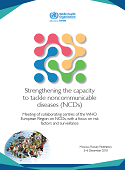Strengthening the capacity to tackle noncommunicable diseases (NCDs) (Moscow, Russian Federation, 5–6 December 2018)

Download
Meeting of collaborating centres of the WHO European Region on NCDs, with a focus on risk factors and surveillance
As pointed out by experts in the field, there is a real danger that the 2025 targets set by the World Health Organization (WHO) in noncommunicable diseases (NCDs) and the United Nations Sustainable Development Goal target on NCDs will not be reached. If the aspirations of these targets and of the report of WHO’s Commission on NCDs are to have any chance of being achieved, a new approach and strategy are needed.
All these global frameworks acknowledge that collaboration is essential in tackling NCDs, which is a complex and systemic health issue. To date, however, collaboration between the WHO Regional Office for Europe (WHO/Europe) and its collaborating centres (CCs) has been bilateral (between WHO/Europe and individual CCs) rather than multilateral (between CCs). While this approach has provided WHO/Europe with valuable information, it does not tap into the potential for collaboration between the various CCs, which could greatly increase the effectiveness of the guidance that WHO/Europe provides to Member States.
In December 2018, WHO/Europe convened a two-day meeting of representatives from various CCs and other academic institutions that focus on NCD risk factors and surveillance. The aim of the meeting was to launch a network of CCs and to tap into the potential for new collaboration between them, with a commitment from WHO/Europe to continue knowledge exchange and to facilitate joint working in the future. This report provides the results of the two-day discussion: an overview of WHO/Europe’s priorities in NCD risk factors and surveillance, proposed research projects identified by CC discussion groups, and next steps.



